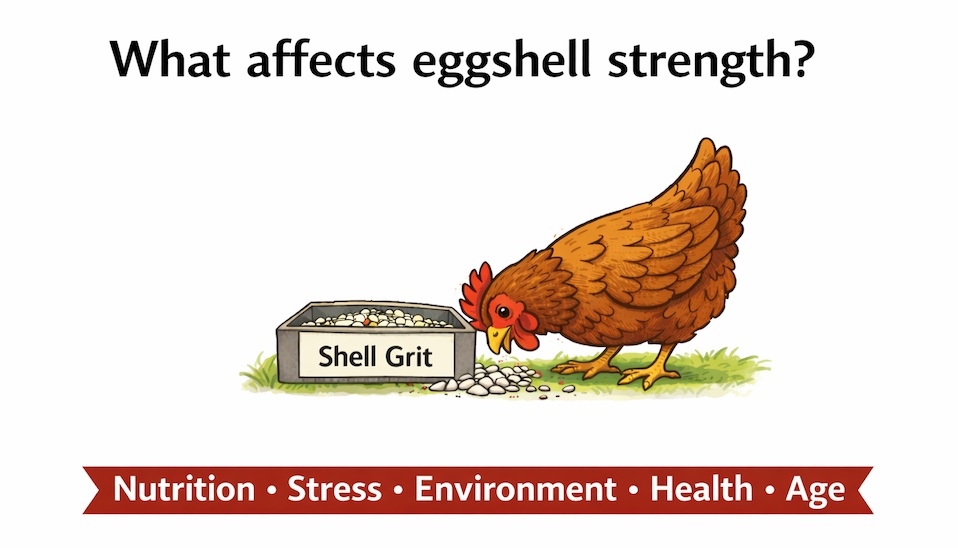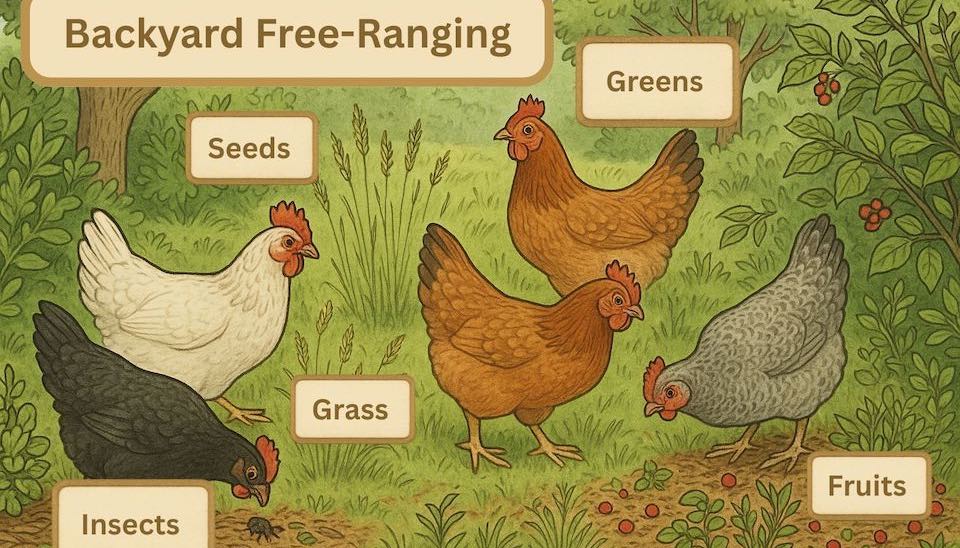The best diet for laying hens
Modern laying hens and the ‘complete’ chicken feed
Laying hens need a good diet to produce plenty of eggs and stay healthy. Constant laying takes a toll on their health if they do not have good nutrition. Although people have been keeping chickens on scraps and whatever the birds can forage for thousands of years, this isn’t a good diet for a modern chicken.
Instead, the best diet for laying hens is:
- Unlimited access to a complete, pelleted layer feed with at least 16 % protein
- Free-access to Shell Grit in a separate dish
- About a tablespoon of whole grain or scratch mix in the evening, not every day
- A little extra protein, such as 4-5 Dried Mealworms
- No more scraps or treats than can be eaten in 20 minutes, always less than 10 % of the diet and not every day
So why can't backyard chickens live on table scraps or what they can forage?
A natural diet for chickens
Chickens are naturally foragers. Jungle fowl, the wild ancestors from which modern chickens are descended, are omnivores and opportunists. They will eat whatever is available, from green forage and seeds, through to insects and even meat.
The standard daily diet of a jungle fowl would include green forage, fruit and seeds. Insects would be the main source of protein, but the birds would kill and eat any small mammals or reptiles that they came across.
However, in order to live on this natural diet, chickens need a lot of room. Jungle fowl live in flocks and roam over territories that cover several acres per bird. This large amount of space not only means plenty of different seeds and fruits year round. It also means that both plants and insect populations have time to recover after the chickens have visited, rather than being killed by daily foraging.
Backyard chickens just can't have a natural diet, because they don't have enough room. Insect populations will quickly plummet in a backyard where chickens forage every day, meaning not enough protein. And backyards just don't have the diversity of forage and fruits found in a chicken's natural jungle habitat.
Why chickens can't live on scraps and forage
After domestication, for hundreds of years chickens were fed scraps and a little grain if available, with the majority of their diet being what they could forage in nearby forests, fields and rubbish heaps. In developing countries, chickens still live on this diet!
While chickens can, technically, live on this type of diet, they cannot thrive. Nor will they be very productive. The simple fact is that most backyard chicken keepers in Australia expect regular egg production, and egg production requires a high-quality diet.
On a diverse farm, with grain crops and other animals, it might be possible for modern chickens to produce well on a more old fashioned diet of just a little grain. Particularly heritage breeds that are well-suited to free-ranging, such as Rhode Island Reds, can forage a good amount of their feed if given enough space and a diverse environment. But less active and more productive chicken breeds cannot. And in a backyard, as opposed to a farm, none of them have a chance!
Why modern laying hens need more protein
Modern laying hens need a balanced, high-protein diet. Although they look the same as the chickens that survived on foraging, scraps and a handful of grain in the farmyards of the Middle Ages, they are very different.
Over the last century, intensive breeding has resulted in modern chickens which are capable of producing an egg a day. The chickens we think of surviving on scraps and forage in the past didn't lay this intensively, and jungle fowl only average 15 eggs a year!
It is no wonder modern hens don’t thrive on a diet of free-ranging and scraps! They need far more protein to sustain such high levels of egg production and remain healthy! Even a small dietary deficiency can cause major problems. This is true of both modern hybrids, such as ISA Browns, and even more traditional heritage breed chickens that may not lay as intensively as the hybrids.
The best diet for laying hens
The best diet for laying hens is simple:
Unlimited access to a complete, pelleted layers feed with a minimum of 16 % protein plus shell grit
Studies suggest that adding a little wholegrain to the diet - about a tablespoon of scratch mix or cracked corn per bird - can be good for digestion.
Extra protein for layers, such as Dried Mealworms, is also helpful.
But the addition of scraps to your chickens' diet can actually dilute the protein, vitamins and minerals in the feed, and lead to deficiencies.
If you are going to feed your chickens scraps, you will need to add a protein supplement as well to ensure your chickens are getting everything they need to be healthy and productive.
Why choose a pellet feed?
You may be wondering why a pelleted feed is the best option for chickens.
Scratch mixes, which contain a bunch of different grains, definitely look more appealing. But their appearance actually causes a problem. They encourage your chickens to eat the ingredients they like and ignore others. So even a scratch mix that is sold as a "complete" feed isn't complete once your chickens have picked through it.
Not only do scratch mixes cause more waste, as chickens won't eat what they don't like, over time they can lead to nutritional deficiencies and health issues for your chooks, not to mention lower egg production!
Because pellet feeds are homogenous, your chickens don't have a choice about which parts they eat. This leads to better health, nutrition and egg production.
If you want to give your chickens something more appealing, add forage, Mealworms or other scraps (the healthy way). But don't replace their feed with a scratch mix!
Feed your chickens scraps the healthy way
There is a way to make scraps work in the diet of a modern layer - supplement them with protein.
Dried Mealworms and Black Soldier Fly Larvae are two great protein-rich, insect-based supplements. When combined with scraps, they stop the scraps from having a negative impact on diet by boosting protein and providing extra vitamins and minerals.
As with all treats, scraps should be fed in moderation. Feed no more than you birds can eat in 10-20 minutes, use a dish and dispose of any uneaten scraps. See our blog post on the Dos and Don'ts of Feeding Scraps to Chickens.
Why do chickens need unlimited access to feed?
The idea that chickens will overeat or eat more if given unlimited access to their feed is completely untrue for 99 % of birds.
Chickens will naturally only eat what they need. The exception to this is when they have a deficiency of some kind. For example, if chickens aren't getting enough protein or calcium, they may eat more feed to try to get what they need. This is why a complete feed formulated to meet the needs of laying hens is so important!
In addition, the natural diet of a chicken is based on foraging. This means they eat relatively small amounts constantly throughout the day, and this is how their digestive system functions best. Limiting access to feed causes chickens to gorge, which can lead to digestive issues of all kinds!
Providing unlimited access to feed is also important because of the chicken pecking order. High-ranking hens get to eat first. If feed is only available in limited amounts or for a short time period, what happens is that the high-ranking hens eat their fill first, and the lower-ranking hens miss out because feed or time has run out. This means low-ranking hens will be less productive and more likely the suffer from health issues.
Do you want to know more about chicken nutrition?
Check out these other blog posts:
- The Dos and Don'ts of Feeding Scraps to Chickens
- The Best Diet for Laying Hens
- Do My Chickens Need a Vitamin and Mineral Supplement?
- What Not to Feed to Chickens
- The Best Forage Greens to Plant for Chickens
All of our chicken keeping advice is based on our years of experience keeping chickens and helping out backyard chicken keepers, as well as extensive research. If there is something you'd like to know, Contact Us.
Happy chicken keeping!
Rachael - Dine a Chook Australia



